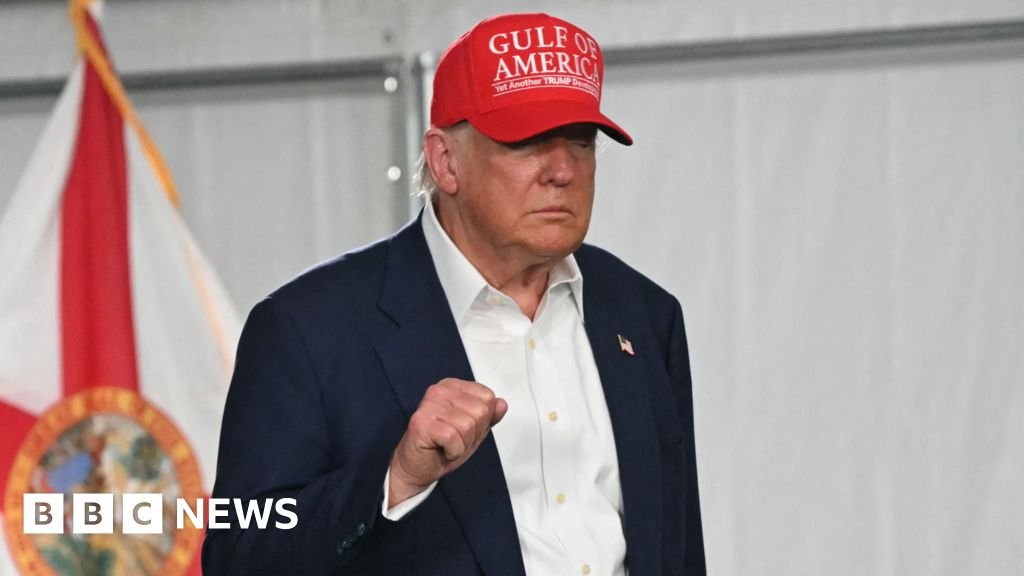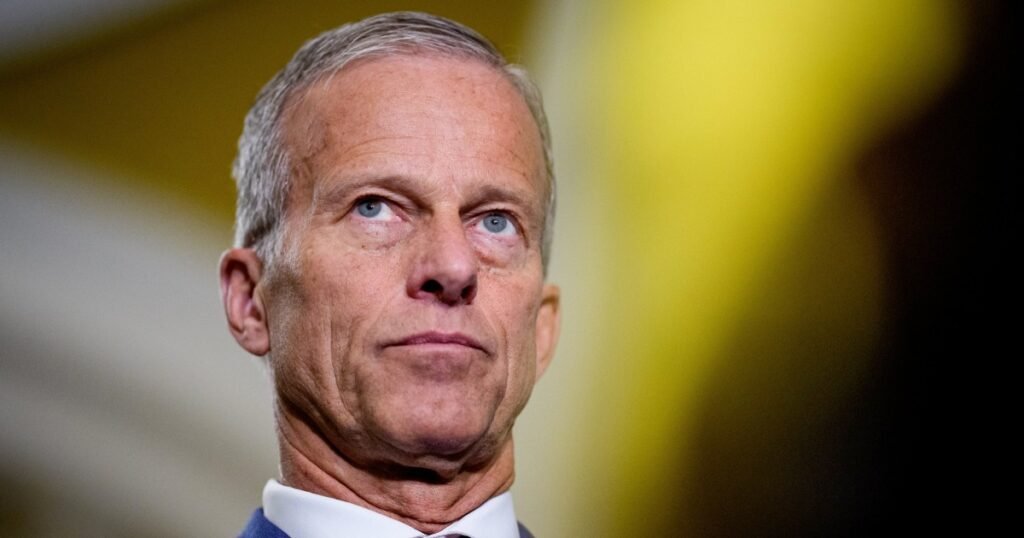Now Reading: Senate Republicans narrowly pass Trump’s ‘big, beautiful’ spending bill
-
01
Senate Republicans narrowly pass Trump’s ‘big, beautiful’ spending bill
Senate Republicans narrowly pass Trump’s ‘big, beautiful’ spending bill

BBC News
After hours of stalemate, Republicans in the US Senate have narrowly passed Donald Trump’s mega-bill on tax and spending, meaning the proposed legislation has cleared one of its key hurdles.
The One Big Beautiful Bill Act passed with Vice-President JD Vance casting a tie-breaking vote after more than 24 hours of debate.
It now heads back to the House, or lower chamber, where it still faces more opposition. An earlier version was cleared by House Republicans by a single-vote margin.
Trump had given the Republican-controlled Congress a deadline of 4 July to send him a final version of the bill to sign into law.
“The bill as amendment is passed,” Vance said on Tuesday afternoon, a moment that was met by applause among Senate Republicans, while Democrats sank into their seats and shook their head in disapproval
Disputes over the deficit, social programmes and spending levels had created challenges for Republicans, stalling progress and prompting Trump concede it would be “very hard” to meet his deadline for passing the bill.
Despite efforts to galvanise his party, Senate Majority Leader John Thune lost three Republicans – Maine’s Susan Collins, North Carolina’s Thom Tillis and Kentucky’s Rand Paul – in the narrow vote. Collins, Tillis and Paul joined all Democrats in voting against the bill.
After days of negotiations, Republican leaders were finally able to secure the support of Alaska Senator Lisa Murkowski, who had been withholding her support over concerns of the impact of cuts to Medicaid in her state.
Murkowski still appeared discontent with the bill, even after voting to support it, describing the process as “rushed” and under an “artificial timeline”.
“I struggled mightily with the impact on the most vulnerable in this country”, Murkowski said, adding the process was “probably the most difficult and agonizing legislative 24-hour period” of her career.
“My hope is that the house is going to look at this and recognise that we’re not there yet,” she told reporters just outside the Senate floor, moments after the vote.
Murkowski’s support made the final Senate vote tally 50-50, and prompted Vance to step in to cast his tie-breaking vote.
 Getty Images
Getty ImagesOn a visit to a migrant detention facility in Florida, Trump celebrated the passage of the bill. “It’s a great bill,” he said. “There is something for everyone.”
The legislation, considered a cornerstone of Trump’s second-term agenda, would make permanent large tax cuts that were temporarily put in place when he was first in office.
To make up for the expected loss of revenue, Republicans have looked to cut spending in a wide range of programmes, including food subsidies and healthcare for lower-income Americans.
The vote came on Tuesday afternoon, concluding a whirlwind voting session on Capitol Hill.
Democrats had attempted to flex their muscles by putting up procedural hurdles against the bill to delay its passage.
That included requiring Senate clerks to read all of the bill’s 940 pages aloud, and launching a lengthy debate process over proposed amendments in what is called a “vote-a-rama”.
It is now up to House Republicans to approve the changes made by the Senate before the president can sign the bill into law.
But its fate remains uncertain, as it has been opposed from different angles and Republicans can only afford to lose three votes.
A group of fiscal conservative hawks have signalled their unhappiness with how much the Senate proposal could add to the US national deficit – which refers to the difference between what the government spends and what it raises in revenue each year.
According to the right-wing House Freedom Caucus, the Senate proposal could add $650bn (£472bn) to the deficit each year. “That’s not fiscal responsibility,” caucus members said in a social media post on Monday. “It’s not what we agreed to.”
Meanwhile, other House Republicans are concerned that the Senate legislation would make steeper cuts to the Medicaid health insurance programme for lower-income Americans than they had approved.
Democrats in both chambers of Congress, too, have criticised the proposed welfare cuts.
Republicans in the House of Representatives will be working against a previously-imposed 4 July deadline from the president.
“I’d love to do July 4th but I think it’s very hard to do July 4th…. I would say maybe July 4th or somewhere around there,” Trump told reporters as he was departing the White House for Florida.
Among the other critics of the plans are tech billionaire Elon Musk, who helped Trump to win the White House last year and served as Trump’s cost-cutting tsar.
Musk is now actively working to spoil the chances of survival for Trump’s signature legislation, and has threatened to set up a new political party if the bill clears Congress.
On Monday, he threatened to back challengers to Republicans who vote for it.
“Every member of Congress who campaigned on reducing government spending and then immediately voted for the biggest debt increase in history should hang their head in shame!” Musk wrote on X.
The bill’s severe reductions to government support for renewable energy and electric vehicles could hurt the bottom line for a company where Musk made some of his fortune, Tesla, as well.



















































